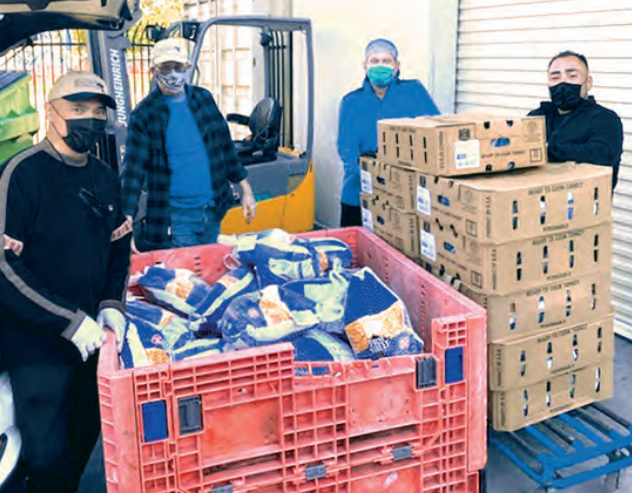The Man Behind St. Joseph’s Family Center
Nebraska born David Cox spent nine years working for a volunteer organization helping locals in a small town in Mexico after completing his undergraduate studies, an experience
that redefined his purpose in life. “It was a life changing event,” Cox said. “I saw and did things I was never exposed to. I saw for the first time what community really meant.”
This realization set the course for his career choice—working with communities within the non-profit world. In 2001 the executive director position at St. Joseph’s Family Center (SJFC) opened up after Marge Albaugh, founder of SJFC, retired. Cox interviewed for the position and was hired. Working for an organization that provides thousands of underserved South County residents with the essentials in life was the perfect fit for Cox. It still is.
“I really, really do love my work but what I really love more is the community,” Cox said. “I like being with the people. I like being the ‘boots on the ground’. It keeps me aware about the community’s needs. My comfort zone is my community.”

This year, as Cox celebrates his 20th anniversary with SJFC, he faces the New Year with hope and optimism. Included among this year’s goals is enhancing a deep commitment to gender and racial equity. “Those to me are the two big ones,” Cox said, adding, he wants to ensure that is part of the organization’s culture moving forward. “That is the banner we
will stand behind.” But Cox doesn’t stop there. His list continues.
“I want to keep us viable, I want us to keep being able to be responsive,” Cox said. “I want us to continue to try and engage the community, and I want us to focus on bringing back our programs full strength. I think we’re going to continue with our stability and our accessibly and try—to the best of our ability—to continue to meet the needs that we see.”
Prior to the pandemic SJFC’s most utilized resource, the Food Pantry, was providing approximately 300 thousand pounds of food a month and serving 100 families per day. From April through June of last year, those numbers more than tripled. “We were serving 600 plus families a day,” Cox said. SJFC faced additional challenges as well. The Lord’s Table, a program that provides three hot meals a week to the homeless and unhoused, was curtailed. “We and other agencies have had to adapt and pivot and do things differently but we’ve also just had to accept we can’t do things like we want to,” Cox said.
I want to keep us viable, I want us to keep being able to be responsive. I want us to
continue to try and engage the community, and I want us to focus on bringing back our
programs full strength.
The Food Pantry was limited to drive-thru service. Financial assistance and case management were conducted online instead of in person. Cox readily admits this alternative method of serving the community had its flaws. “Obviously there are a number of families that were falling through the cracks, those that are challenged by language, certainly challenged by
technology,” Cox said. “I think we’ve adapted and assimilated the best we can.”
Last August SJFC was personally affected by the pandemic when one of its staff members was diagnosed with Covid. Under advisement of the Public Health Department the Pantry immediately went into self-isolation for 14 days. Thanks to the generosity of Catholic Charities and Second Harvest of Silicon Valley, the much needed food distribution continued during the isolation. “We did the best we could,” Cox said, adding, “We’ve been very cautious and very safe.”
While a number of services and programs were halted in 2020, an additional resource was provided to SJFC—the Cares Act—which allowed the center to institute a homeless prevention grant with the city of Gilroy. “We’ve been administering that for about a month now,” Cox said. “But we’ve been trying to do most of that online.”
SJFC has also taken part in a three phase plan organized by Destination Home, which serves as the backbone organization for collective impact strategies to end homelessness in Santa Clara County, and helps channel funds into South County communities. “We’ve helped crank hundreds and hundreds and hundreds of thousands of dollars of private funds into these communities by working in those phases,” Cox said.
“So on top of our regular homeless prevention efforts, we’ve added this to our task. Certainly in these times it’s been very, very, important. Every cent we get from them goes to the
community. If it weren’t for the benevolence and the support we get from the community, I couldn’t do that. We will find other ways through our blessed support system to make that happen. We will continue to do that certainly into the New Year and as long as it takes to kind of get through this very, very, difficult pandemic. We’re going to stay the course,” Cox said.